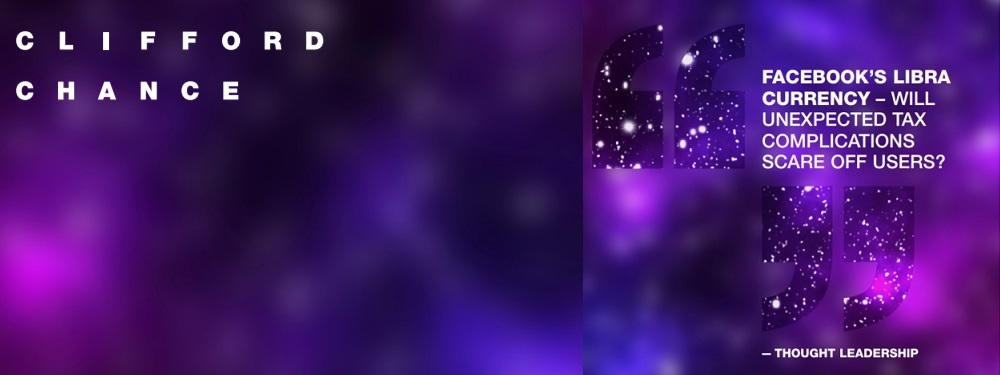
The essence of Libra is that Facebook hopes consumers across the world will spend money in a new cryptocurrency. Its value will track a basket of fiat currencies, meaning that the value of a Libra against a particular fiat currency will inevitably fluctuate. That creates a problem for consumers: each time they transact, they’ll be making a capital gain or loss. In most countries gains will be taxable, meaning consumers will have to file a detailed tax return showing all their transactions and the exchange rate at the time, and pay any tax due. This seems to us to be a significant barrier to wide adoption, according to Clifford Chance’s analists.
While some of these issues may be mitigated by the fact that Libra is intended to be relatively stable, we would nevertheless expect it to be at least as volatile as a traditional fiat currency. In any event, heavy users of Libra in many jurisdictions are likely to find computing their tax liability a real challenge, with a capital gains computation required to be undertaken for a potentially very large number of transactions occurring throughout the tax year.
One might ask: why don’t these issues arise at the moment when people spend money in foreign fiat currency? The answer is that most countries don’t charge tax on personal foreign currency transactions conducted abroad. A UK resident spending US dollars in New York faces no UK tax consequences, even if the US dollar appreciates during their stay. On the other hand, if that same UK resident spent US dollars in the UK then there would be taxable events – but this would be an unusual thing to do (currency speculation aside).
This seems to us a big problem for Libra to solve. How many consumers will be willing to deal with a new level of tax compliance, and face potential tax liability, in order to use Libra? What are the potential answers?
A political solution: Libra could lobby governments and tax authorities to create a special exemption from tax on Libra gains and losses. Facebook have said that they “look forward to working with policymakers as they clarify the application of existing tax laws to cryptocurrencies, or in some cases to update those laws”. However, it seems to us that the chances of reaching such an agreement with tax authorities in all major markets seem slight – why should Libra be treated any differently from a “real” currency, or any other cryptocurrency? And why would tax authorities agree to potentially miss out on taxing users’ gains? And if governments did agree to this for Libra, would this breach State aid/ anti-subsidy rules?
A tech solution: Libra could integrate a user education program and automatic tax calculation and reporting systems to make the process as straight-forward as possible for consumers and tax authorities and taxpayers. Facebook have indicated that they “expect that many wallets and financial services built on the Libra Blockchain will provide people with tools to help manage this”. But the prospect of an unexpected tax bill at the end of the year could still be off-putting to many consumers and would simply highlight to users the relative advantage of transacting in local currency instead of Libra.
A market solution: Libra could simply not operate in countries where the tax treatment for consumers is awkward (or, alternatively, operate, but not expect large scale take-up). It might be thought that tax authorities in the developing world (clearly a significant Libra target) would take a more lenient approach than tax authorities in the EU or the US. That seems to us an unsafe assumption – particularly for countries accustomed to applying capital controls to prevent outflows from their economy.
A more fundamental solution: Libra could change so that, instead of being a new currency, it is essentially an e-wallet system. A UK consumer spends £50 to buy £50 of Libra and spends £ in UK stores. A French consumer spends EUR50 to buy EUR50 of Libra and spends EUR in Eurozone stores. And so on. When spending in a different currency FX conversions are made instantaneously at the point of transacting. The tax complexities melt away; but so does the uniqueness of the proposition – and this would amount to a significant reversal from what has been announced.
Finding a solution which meets both Libra’s apparent aspirations and the needs of its intended users does not appear to be straight forward. If Libra is to launch in 2020 as expected, the Libra Association will need to move quickly to solve these issues in order to ensure that it delivers the seamless experience users have come to expect from Facebook and its other founding members.
Banking 4.0 – „how was the experience for you”
„To be honest I think that Sinaia, your conference, is much better then Davos.”
Many more interesting quotes in the video below: